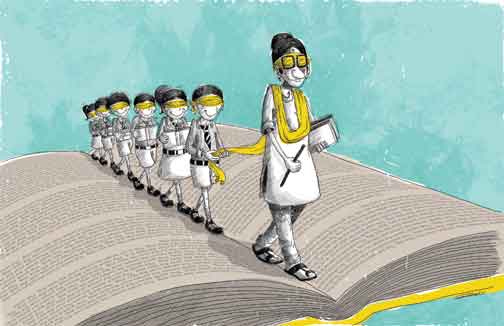Malini Seshadri
You are a teacher of English and you are visiting another school. The students are strangers to you. You have just asked a senior class to write out their answers to this question: How is the sex of a child determined in the womb? They have no idea what kind of answer you are looking for. You may receive an answer like this:
In the prenatal period, sex determination and differentiation occur in a series of sequential processes governed by genetic and environmental factors.
OR like this:
In the womb, a few weeks after conception, an embryo will form ‘proto-gonads’. Several weeks later, those proto-gonads will take one of two paths to become either testes or ovaries. This will determine the sex of the foetus.
OR like this:
Deep within my cells, a muffled detonation of one of my chromosomes triggered an unstoppable and irreversible chain reaction. A new genetic force pulsed through my miniscule body, throwing one switch after another and resetting the coordinates of my embryonic voyage. Cells within my body laid aside one set of genetic instructions, unrolled another blueprint, and set to work altering my small anatomy. Seven and a half months later I was pushed out from my warm home into the blinding white light of the world. The very first words I ever heard defined what I had become: ‘It’s a boy!’
All are in perfectly correct English. Let us assume that all of them answer the question satisfactorily. As a teacher of English, how would you assign marks to these three answers? Why?

Hold that thought a minute, while I cut in here with a confession. I have never taught English in a classroom. Let me expand on that; I have never taught English at any time anywhere to anyone. Period. My only experience with English teaching has been from the receiving end, as a student. A couple of my teachers I remember with affection; one I remember with dread; most I do not remember at all; and one, only one, I remember with awe and unabashed admiration. Let me hasten to add, however, that my intention is not to criticise English teachers, it is to comment on the status of English teaching.
Everyone I know, and therefore, by extrapolation, many, many others, have their opinions about how English is being taught in our schools, how it should be taught, and even whether it should be taught. (Let us label the latter group as outliers and remove them from our consideration for the purposes of this article). I am therefore in good (or at least substantially plentiful) company, when I declare that I too have an opinion.
After that small but necessary digression, let us go back to the question and its three answers. As I said, all are in correct English, and let us assume that all are correct as to substance. How would you rank them, and why? Obviously, that would depend on your own expectations. Do you want journalese? Do you want factual Wikipedia with its straightforward approach and economy of words? Or do you want Bryan Sykes with his extravagant word paintings?
More importantly, what were the students’ expectations of what you were looking for? How had they been taught or (more realistically) instructed to write? Which is the answer that is expected to fetch more marks? (Because that is the determinant of what the dutiful and conformist student will dish out).
Of what use is a map if we don’t know where we are going?
It is easy, indeed fashionable to critique how English is taught in schools. But not many seem to go beyond the methodology to explore the content. Still fewer dig deeper to unearth a purpose behind the content. Even where a purpose exists, it is seldom clearly spelt out along with a logical rationale.
In other words, when we attempt to “teach” English in a classroom, we should ideally be absolutely clear what specifically we are seeking to teach, and how we want to evaluate what is “learnt”.
That, in turn, would require a clear answer to an even more fundamental question: “Why are we teaching English?” (This question would obviously have relevance to the teaching of other languages as well, but let us stay with English so as not to get side-tracked).
We could say, “It is useful to know the language for getting along in life.”
Or, “It is the language of communication of millions of people in the world.”
Or, “It is an important language in India because of our history, and because it is used throughout the country.”
Maybe we have other answers:
“English is a great world language with a wealth of inspiring literature.”
Or, “English is a live, inclusive and evolving language, with a growing vocabulary contributed to by virtually every part of the world.”
All these are perfectly pertinent reasons to teach the language in our classrooms.
 But have we spelt out our reasons clearly? Have we selected our teaching materials accordingly and have we tailored them to our target group of students? Have we structured the curriculum to achieve the defined purpose efficiently? In other words, have we fully understood that what we are teaching should ideally match with why we are teaching it? I would venture to say no.
But have we spelt out our reasons clearly? Have we selected our teaching materials accordingly and have we tailored them to our target group of students? Have we structured the curriculum to achieve the defined purpose efficiently? In other words, have we fully understood that what we are teaching should ideally match with why we are teaching it? I would venture to say no.
What English teaching are we talking about?
There are obviously different levels at which English can be and is taught. There are the ubiquitous spoken English classes, and they do not purport to be anything other than basic bread-and-butter “Is the bus late?” and “How much do the tomatoes cost?” kind of teaching, with no written work involved. Then there are the courses on English “communication skills.” These have generally been interpreted narrowly (and to my mind lazily) as letter-writing, filling in application forms, or some such undeniably useful but definitely mundane tasks. Letter-writing itself has been rendered archaic by email and SMS (C U @ 6 PM). What about the student who wants to communicate something more than where to meet for coffee? Like an emotion, for instance? Is the teaching course designed to deliver the necessary skills to such a student?
A language has a soul
One can learn to sing a song by listening to it repeatedly, and even be pitch perfect (provided one does not have a tin ear!). In this karaoke type of learning, one need not even know what the lyrics mean, as long as one can mimic the sounds. But proficiency in reproducing this learnt song does not equate with a mastery of music. The latter calls for learning the scales, reading the music, understanding the lyrics, internalising the nuances of the scale or the raga. And even then, the task has only just begun. Music has a soul; a song has only a form. The real challenge lies in seeking the soul.
A language can be compared to music. Like learning a karaoke song, one can learn to use the language without actually studying it. But since a language is a living system, it cannot be mastered until its anatomy and physiology are thoroughly explored. It has a structure, a syntax, a vocabulary, a grammar. And even then, its soul can be elusive.
Why is the thrill missing?
Back now to our earlier question. Why are we teaching English to our school children? Add a supplementary question: “Why are we continuing to teach English even in classes 11 and 12 to children in English medium schools, who would presumably have learnt by then to “communicate” and “get by” in English? Are we, at least in this subgroup of learners, looking to hone higher skills? Are we seeking to foster appreciation if not awe for the flexibility, liquid grace, inspiring heights and sheer grandeur that the language is capable of revealing to the true seeker of its treasures? If so, how can one account for the following:
- The textbooks hold no hint of any such intention.
- The teachers, with some very rare exceptions, make no mention of the hidden dimensions of the language that are waiting to be explored.
- The students, by and large, find the English class “boring” or “easy” or “bunkable”.
- A distressingly large number of students in high school have read the great classics only as “stories retold” and never in the original.
- A frighteningly high majority of the students emerge from school with neither mastery of usage of the English language, nor the benefit of wide reading in the language, leave alone an appreciation of its beauty.
Should we just settle for this “English in five easy steps” approach (today you can learn how to draw a swan, next week we will show you how to draw an elephant or maybe a butterfly)? When we ask a child, “Have you completed the English syllabus?” shall we just settle for the answer, “Yes, our teacher has almost finished. We have finished letter-writing, now we have to do a few exercises in comprehension and some model questions. She says she can even hand over some free periods for extra maths classes.”
Should we not make the attempt to get at least some of the students to feel the sheer elation of reading soaring prose, to feel the gooseflesh when reading aloud lines of sublime poetry?
Why settle for a dull status quo when we could “rage, rage against the dying of the light”?
The author is a freelance writer and translator. She writes textbooks and edits articles for scientific journals. Her first story book for children has been published recently. She can be reached at malini_seshadri@airtelmail.in.
